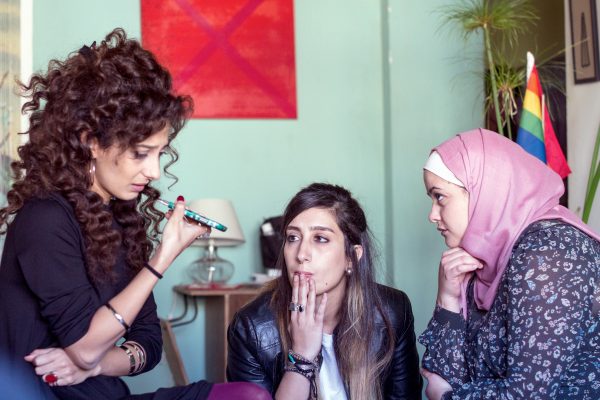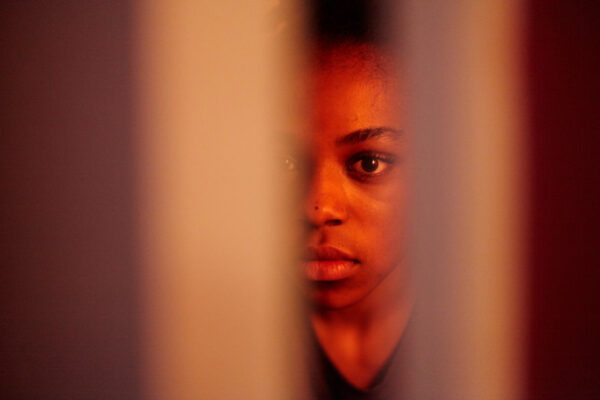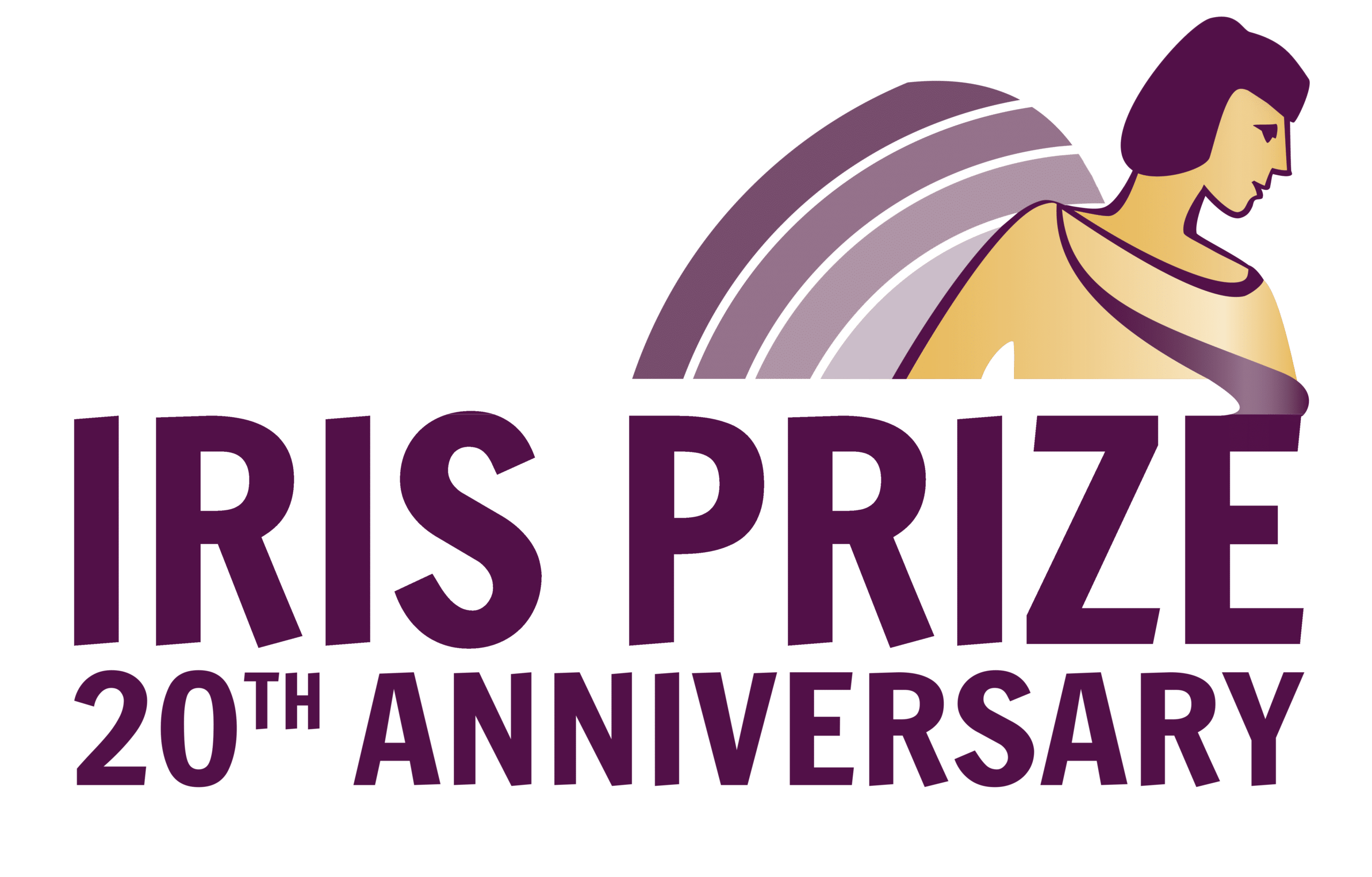DAY 5 IRIS REVIEWS: IN BETWEEN, WE LOVE MOSES, THE MESS HE MADE
Suri Mukherjee reviews some of the films screened on the 5th day of the festival aka Super Saturday. It is the last of the Iris Reviews.
Super Saturday had a lot happening. In the morning, we had an LGBT+ youth event for which I delivered a talk about
Glitter - an LGBT+ group for Black, Asian and Minority Ethnic people that I am a member of. Right after, I went in to watch 'In Between' (Bar Bahar) which was pure bliss. And then of course, the top 3 shorts in the final running for Best British and the Iris Prize were screened! It was an exciting and unpredictable reveal. And I honestly have no idea who will be winning the titles tomorrow.
But all through I was accompanied by the dim realisation that we are nearing the end. No more will we watch films for the day's work. No more will we get to share our love for films with their makers. So, what do we do after the end of the Iris Prize film festival? We wait for the next one, of course!
But for now, enjoy Saturday's Iris Reviews. And don't forget to come to the Iris Carnival in the Depot later! I will see you there.
 In Between (Bar Bahar)
In Between (Bar Bahar)
'In Between' is the kind of movie I go to the theatres for. It gets everything right.
It is a story of three Palestinian women sharing a flat in Tel Aviv, Israel. From the outset, these complex characters seem to be quite different from each other. But ultimately, they are united by their desire to simply be themselves - which is asking for a lot in their patriarchal and homophobic environment.
Director Maysaloun Hamoud has said that she wanted to diverge from the usual Israel-Palestine narrative of war and soldiers. She wanted to explore the daily life of the people there. So, we have house parties, hashish,
music and poetry. There is a whiff of the conflict but it is tempered with tolerance. A great portrayal of this lies in Mouna's flirtatious friendship with her Jewish Israeli colleague. The two lawyers strike a deal on their case and then he asks her out. She reminds him that his mother wouldn't accept her because of their different backgrounds, and they should stick to only flirting. Sana quits her job at a restaurant as she is rebuked for breaking the rules by speaking in Arabic. At her next employment, an employee asks about her background. She says Palestinian. You brace for his reaction at this point but he nonchalantly replies, "Cool."
My favourite thing in this film is the strong bond of sisterhood the three protagonists share, which is reminiscent of Lebanese director Nadine Labaki's work. It reaches its pinnacle after Noor experiences a terrible ordeal, and the other two lovingly help her shower. There is nothing more tender or comforting than that image of Sana and Mouna washing Noor's hair. The women all come from different backgrounds, with Noor wearing a hijab and Sana's family being Christian. Refreshingly, Noor does not undergo a liberal 'makeover' by discarding her hijab like the other two. She is liberated by being herself. The women are constantly asked to change themselves - ranging from giving up smoking to becoming straight. They do not negotiate with their oppressors, they leave.
 We Love Moses
We Love Moses [Best British Top 3]
This is a story from 12-year-old Ella's perspective. It is astonishing how realistically writer-director
Dionne Edwards has recreated the world of a young girl discovering sex. I inevitably found myself going back to that phase of my life - being curious about sex and being teased for it, like Ella. And I'm sure most of us have cringeworthy memories from things we did as kids, especially with regard to crushes. So does Ella. And like many of us, Ella had to confront issues she wasn't equipped to deal with at that age. But she tried anyway. That is how 'We Love Moses' wins your love. It articulates experiences that we have all had but we haven't seen represented on screen. When you see it, you immediately recognise it.
I also loved the film's beautiful cinematography, with every shot expertly conveying the mood of the scene. My favourite would be the part where the camera moves through layers of people in slow-motion as it articulates the popularity of Ella's brother Michael and his best friend Moses. The remarkable acting of the cast and the smooth dialogue-writing add to the rest to really make this short memorable. It comes as no surprise that it is one of the three films shortlisted to be the Best British winner.
 The Mess He Made
The Mess He Made [Iris Prize Top 3]
This short begins with the protagonist getting tested for STDs. And so it seems to join the legion of gay films exploring the same experience. It seems to harken back to the HIV epidemic and its effect on the gay community. But this is a completely different story. There are plot twists for the audience to disentangle as the film moves forward. It is not the usual torturous experience of a gay man who has made a mistake. [Spoilers ahead.]
From the first phone call, you realise that he is angry with the man he thinks he contracted the STD from. There seems to have been a violation of trust on some level. It becomes crystal clear on the second phone call. He has a daughter. The man is his husband. And that is how a familiar story becomes subversive. His husband must have cheated on him. It stops being about homosexuality and HIV, and it becomes about relationships and betrayal. It becomes about bearing the consequences of the mess someone else made.
What makes this film memorable, is the impeccable acting by the protagonist who doesn't miss a beat. He is in complete control of his craft and it is seared into the audience's mind in the final scene. After he hears the result of the test, he begins to cry and then he begins to smile. His face masterfully alternates between the two emotions till the credits roll, keeping the audience in the dark.
 In Between (Bar Bahar)
'In Between' is the kind of movie I go to the theatres for. It gets everything right.
It is a story of three Palestinian women sharing a flat in Tel Aviv, Israel. From the outset, these complex characters seem to be quite different from each other. But ultimately, they are united by their desire to simply be themselves - which is asking for a lot in their patriarchal and homophobic environment.
Director Maysaloun Hamoud has said that she wanted to diverge from the usual Israel-Palestine narrative of war and soldiers. She wanted to explore the daily life of the people there. So, we have house parties, hashish, music and poetry. There is a whiff of the conflict but it is tempered with tolerance. A great portrayal of this lies in Mouna's flirtatious friendship with her Jewish Israeli colleague. The two lawyers strike a deal on their case and then he asks her out. She reminds him that his mother wouldn't accept her because of their different backgrounds, and they should stick to only flirting. Sana quits her job at a restaurant as she is rebuked for breaking the rules by speaking in Arabic. At her next employment, an employee asks about her background. She says Palestinian. You brace for his reaction at this point but he nonchalantly replies, "Cool."
My favourite thing in this film is the strong bond of sisterhood the three protagonists share, which is reminiscent of Lebanese director Nadine Labaki's work. It reaches its pinnacle after Noor experiences a terrible ordeal, and the other two lovingly help her shower. There is nothing more tender or comforting than that image of Sana and Mouna washing Noor's hair. The women all come from different backgrounds, with Noor wearing a hijab and Sana's family being Christian. Refreshingly, Noor does not undergo a liberal 'makeover' by discarding her hijab like the other two. She is liberated by being herself. The women are constantly asked to change themselves - ranging from giving up smoking to becoming straight. They do not negotiate with their oppressors, they leave.
In Between (Bar Bahar)
'In Between' is the kind of movie I go to the theatres for. It gets everything right.
It is a story of three Palestinian women sharing a flat in Tel Aviv, Israel. From the outset, these complex characters seem to be quite different from each other. But ultimately, they are united by their desire to simply be themselves - which is asking for a lot in their patriarchal and homophobic environment.
Director Maysaloun Hamoud has said that she wanted to diverge from the usual Israel-Palestine narrative of war and soldiers. She wanted to explore the daily life of the people there. So, we have house parties, hashish, music and poetry. There is a whiff of the conflict but it is tempered with tolerance. A great portrayal of this lies in Mouna's flirtatious friendship with her Jewish Israeli colleague. The two lawyers strike a deal on their case and then he asks her out. She reminds him that his mother wouldn't accept her because of their different backgrounds, and they should stick to only flirting. Sana quits her job at a restaurant as she is rebuked for breaking the rules by speaking in Arabic. At her next employment, an employee asks about her background. She says Palestinian. You brace for his reaction at this point but he nonchalantly replies, "Cool."
My favourite thing in this film is the strong bond of sisterhood the three protagonists share, which is reminiscent of Lebanese director Nadine Labaki's work. It reaches its pinnacle after Noor experiences a terrible ordeal, and the other two lovingly help her shower. There is nothing more tender or comforting than that image of Sana and Mouna washing Noor's hair. The women all come from different backgrounds, with Noor wearing a hijab and Sana's family being Christian. Refreshingly, Noor does not undergo a liberal 'makeover' by discarding her hijab like the other two. She is liberated by being herself. The women are constantly asked to change themselves - ranging from giving up smoking to becoming straight. They do not negotiate with their oppressors, they leave.
 We Love Moses [Best British Top 3]
This is a story from 12-year-old Ella's perspective. It is astonishing how realistically writer-director Dionne Edwards has recreated the world of a young girl discovering sex. I inevitably found myself going back to that phase of my life - being curious about sex and being teased for it, like Ella. And I'm sure most of us have cringeworthy memories from things we did as kids, especially with regard to crushes. So does Ella. And like many of us, Ella had to confront issues she wasn't equipped to deal with at that age. But she tried anyway. That is how 'We Love Moses' wins your love. It articulates experiences that we have all had but we haven't seen represented on screen. When you see it, you immediately recognise it.
I also loved the film's beautiful cinematography, with every shot expertly conveying the mood of the scene. My favourite would be the part where the camera moves through layers of people in slow-motion as it articulates the popularity of Ella's brother Michael and his best friend Moses. The remarkable acting of the cast and the smooth dialogue-writing add to the rest to really make this short memorable. It comes as no surprise that it is one of the three films shortlisted to be the Best British winner.
We Love Moses [Best British Top 3]
This is a story from 12-year-old Ella's perspective. It is astonishing how realistically writer-director Dionne Edwards has recreated the world of a young girl discovering sex. I inevitably found myself going back to that phase of my life - being curious about sex and being teased for it, like Ella. And I'm sure most of us have cringeworthy memories from things we did as kids, especially with regard to crushes. So does Ella. And like many of us, Ella had to confront issues she wasn't equipped to deal with at that age. But she tried anyway. That is how 'We Love Moses' wins your love. It articulates experiences that we have all had but we haven't seen represented on screen. When you see it, you immediately recognise it.
I also loved the film's beautiful cinematography, with every shot expertly conveying the mood of the scene. My favourite would be the part where the camera moves through layers of people in slow-motion as it articulates the popularity of Ella's brother Michael and his best friend Moses. The remarkable acting of the cast and the smooth dialogue-writing add to the rest to really make this short memorable. It comes as no surprise that it is one of the three films shortlisted to be the Best British winner.
 The Mess He Made [Iris Prize Top 3]
This short begins with the protagonist getting tested for STDs. And so it seems to join the legion of gay films exploring the same experience. It seems to harken back to the HIV epidemic and its effect on the gay community. But this is a completely different story. There are plot twists for the audience to disentangle as the film moves forward. It is not the usual torturous experience of a gay man who has made a mistake. [Spoilers ahead.]
From the first phone call, you realise that he is angry with the man he thinks he contracted the STD from. There seems to have been a violation of trust on some level. It becomes crystal clear on the second phone call. He has a daughter. The man is his husband. And that is how a familiar story becomes subversive. His husband must have cheated on him. It stops being about homosexuality and HIV, and it becomes about relationships and betrayal. It becomes about bearing the consequences of the mess someone else made.
What makes this film memorable, is the impeccable acting by the protagonist who doesn't miss a beat. He is in complete control of his craft and it is seared into the audience's mind in the final scene. After he hears the result of the test, he begins to cry and then he begins to smile. His face masterfully alternates between the two emotions till the credits roll, keeping the audience in the dark.
The Mess He Made [Iris Prize Top 3]
This short begins with the protagonist getting tested for STDs. And so it seems to join the legion of gay films exploring the same experience. It seems to harken back to the HIV epidemic and its effect on the gay community. But this is a completely different story. There are plot twists for the audience to disentangle as the film moves forward. It is not the usual torturous experience of a gay man who has made a mistake. [Spoilers ahead.]
From the first phone call, you realise that he is angry with the man he thinks he contracted the STD from. There seems to have been a violation of trust on some level. It becomes crystal clear on the second phone call. He has a daughter. The man is his husband. And that is how a familiar story becomes subversive. His husband must have cheated on him. It stops being about homosexuality and HIV, and it becomes about relationships and betrayal. It becomes about bearing the consequences of the mess someone else made.
What makes this film memorable, is the impeccable acting by the protagonist who doesn't miss a beat. He is in complete control of his craft and it is seared into the audience's mind in the final scene. After he hears the result of the test, he begins to cry and then he begins to smile. His face masterfully alternates between the two emotions till the credits roll, keeping the audience in the dark. 
